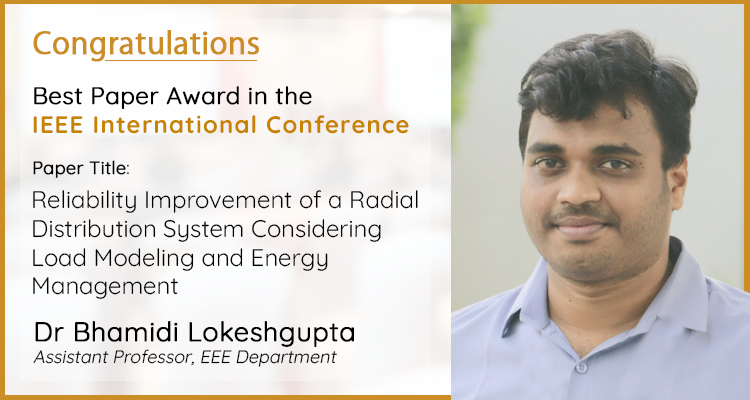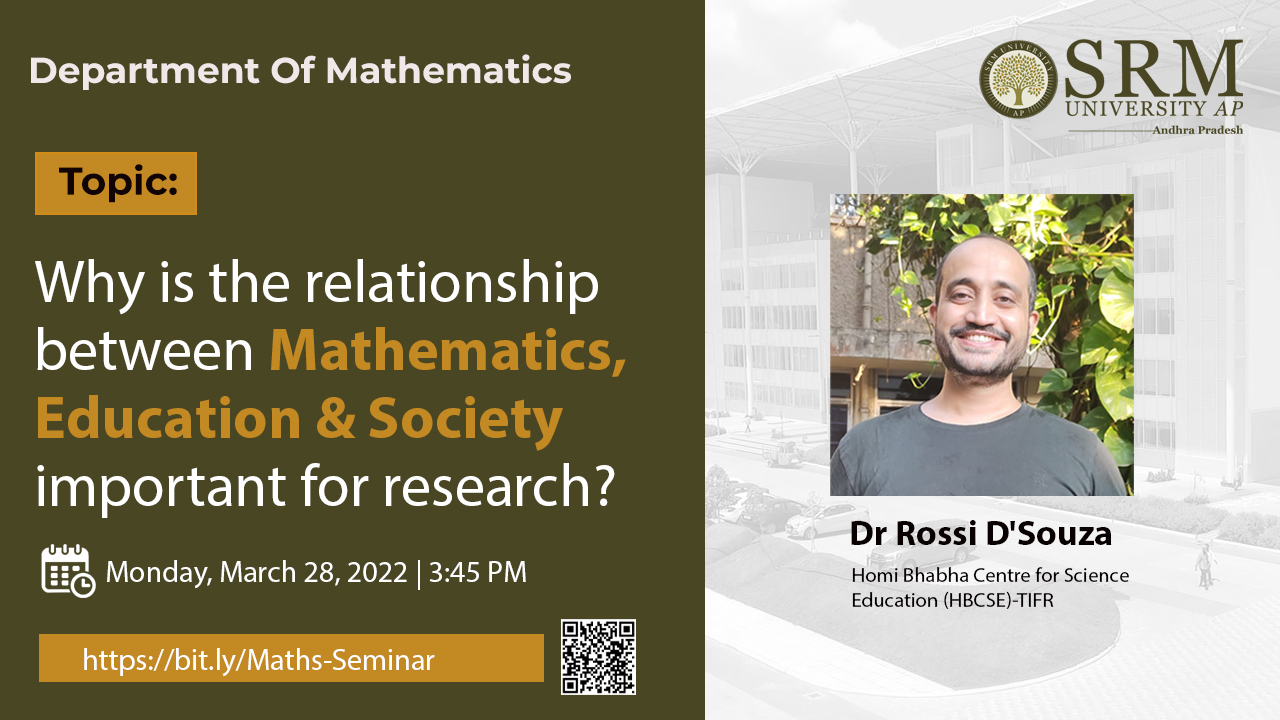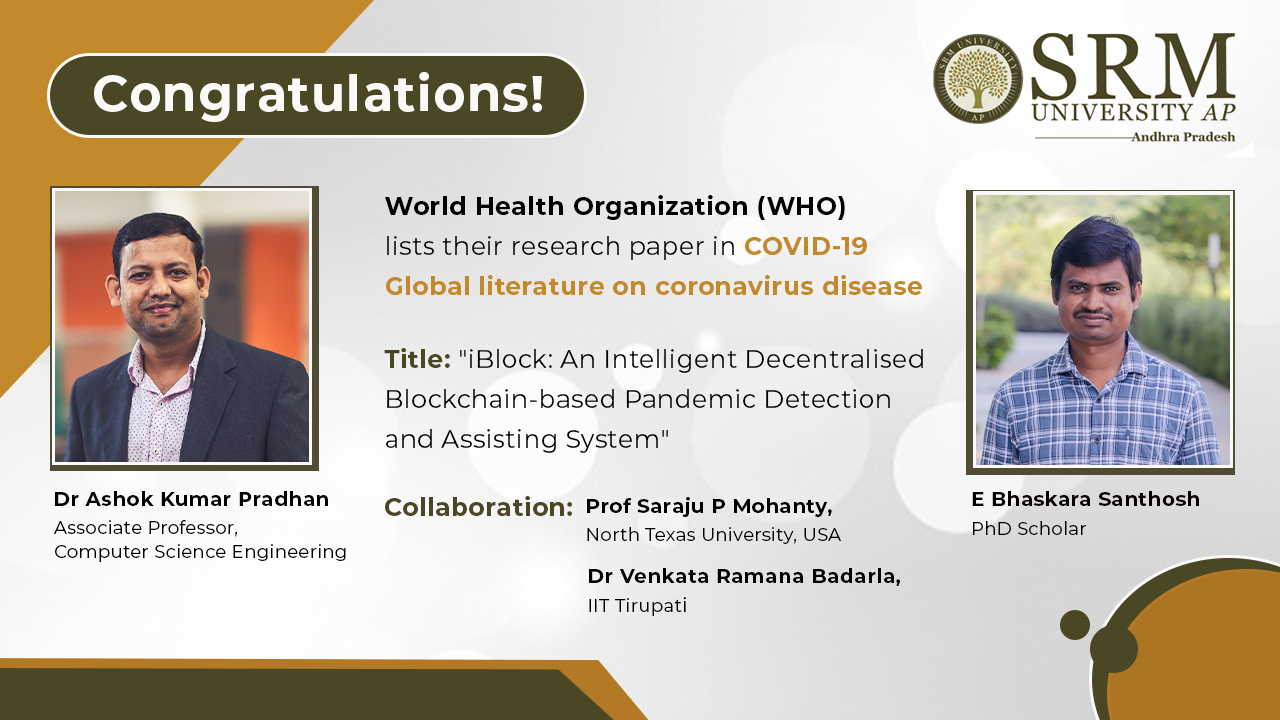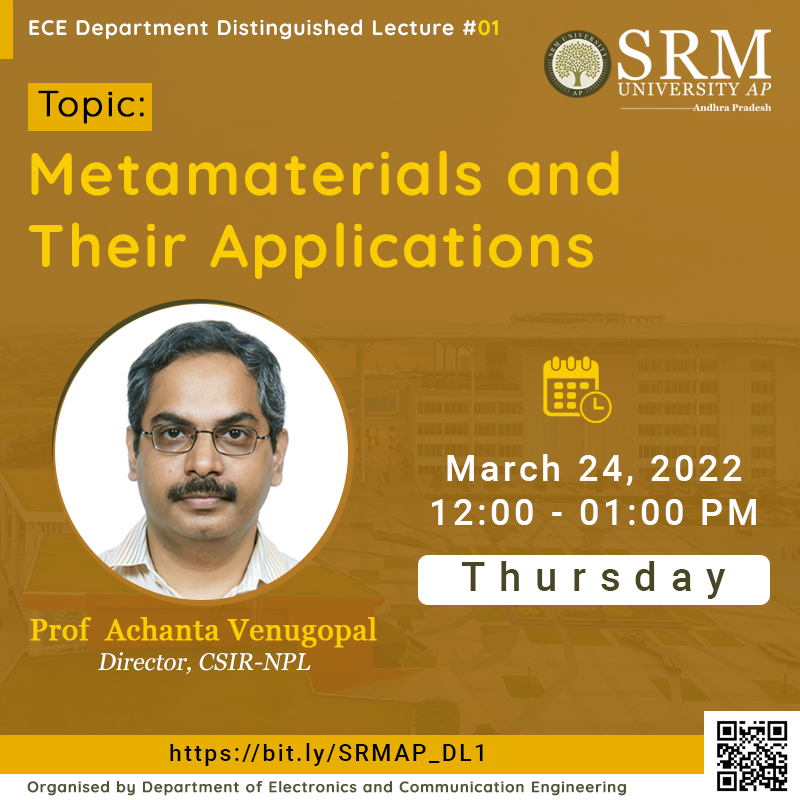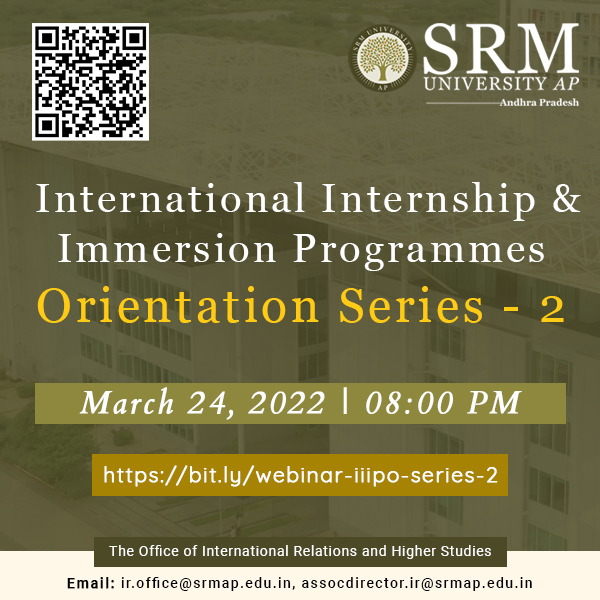All Management Events
- Dr B Lokeshgupta received the Best Paper Award March 28, 2022
Studies that open new possibilities into some of the gripping issues in the scientific domain have transformed SRM University-AP into the epicentre of cutting-edge research and investigations. We are proud to announce that Dr B Lokeshgupta, Assistant Professor of the Department of Electrical and Electronics Engineering has won the Best Paper Award at IEEE Second International Conference on Power, Control and Computing Technologies ICPC²T 2022 held at NIT Raipur, Chhattisgarh. The paper titled “Reliability Improvement of a Radial Distribution System Considering Load Modeling and Energy Management” was co-authored by Dr S Sivasubramani and Mr. Ram Prakash from IIT, Patna. The research gives new insight into energy management and power consumption patterns.
Abstract of the Research
Increasing energy demand and recent advancements in electrical and distributed generation (DG) technology have made power systems complex. Therefore, the reliability assessment is important for efficient planning and operation of distribution networks. The system reliability can be improved with optimal DG integration and energy management schemes. This work mainly studies the impact of optimal DG planning with an energy management scheme on the reliability of radial distribution network. Usually, the reliability of a power system is evaluated using the distribution system reliability indices which are based on load point and customers. The voltage-dependent load model and time-varying load profile for different load classes are included in this work for pragmatic planning. Particle swarm optimization (PSO) algorithm is used to find the optimal site and size of DG units and optimal scheduling of the shiftable loads. The proposed model of optimal DG allocation with energy management is evaluated with a case-based analysis. The modified IEEE 33-bus distribution system is considered in this model to demonstrate the improvement of reliability and operational parameters. Simulation results verify the efficacy of the model.
About the Research
In recent decades, a high load growth rate and frequently changing power consumption patterns are observed due to urbanization and industrialization. Also, the increasing penetration of renewable-based DG has caused a significant mismatch between power generation and electricity demand pattern. This mismatch introduces reliability and power quality issues with loss of energy and revenue to the utilities in power systems. Thus, various energy management programs are carried out by utilities to encourage consumers to change their load patterns. This paper proposes a reliability improvement technique in a radial distribution system by optimal planning of disperse generation and energy management programme.
Social Implication
The research proposes an offline algorithm for the efficient planning and operation of radial distribution networks. Simultaneous deployment of distribution generation (DG) and energy management system (EMS) makes the network more reliable compared to just DG allocation. Application of DG and EMS also improves other operational parameters of the network like power loss and voltage profile.
In future, the energy management concept can be extended with the inclusion of neighbourhood power-sharing model in the environment of multiple smart home consumers and prosumers.
- Breaking the Mathematics myth March 26, 2022
Have you ever thought Mathematics is a hard nut to crack? The Department of Mathematics brings to you Dr Rossi D’Souza to break the myth associated with Math. The seminar will be held on March 28, 2022 at 03.45 pm IST. Dr D’Souza, from Homi Bhabha Centre for Science will deliver a talk on ‘Why is the relationship between Mathematics, Education & Society important for research?’.
Abstract of the Talk
“Mathematics is hard!” has been a universal refrain among school children (and often their parents) for as long as we recall. But why do so many children dislike Mathematics? Is it the way Mathematics is taught – because Math teachers follow a “rote-learning” approach instead of making sure students understand the basic concepts? Why are students from marginalized backgrounds/identities disproportionately lagging behind in & excluded from Mathematics knowledge production? Or is Mathematics really not for everybody?
Drawing on experience from his PhD research with visually challenged students and industry experience the speaker will highlight the importance of taking into account the social factors in Mathematics Education Research to effectively address the challenges posed by STEM Education – and to work towards a world where Mathematics really is for everybody!
Speaker’s Profile
Dr Rossi D’Souza recently completed his PhD in Mathematics education from HBCSE-TIFR. His research interests include exploring how ableism operates in Mathematics education. Prior to working as a Research scholar, Rossi completed his M.Tech in Modeling and Simulation from Pune University, specializing in and then working in the field of Computational Genomics. He has also worked as a visiting lecturer at Govt. Polytechnic Mumbai, as a medical instrument repairman at Narayana Hrudayalaya Hospital, Bangalore and as a Science Communicator on the Science Express train.
Join the session with Dr D’Souza and make your Mathematics learning a delightful experience.
- Raise yourselves up with the rising industrial expectations March 26, 2022
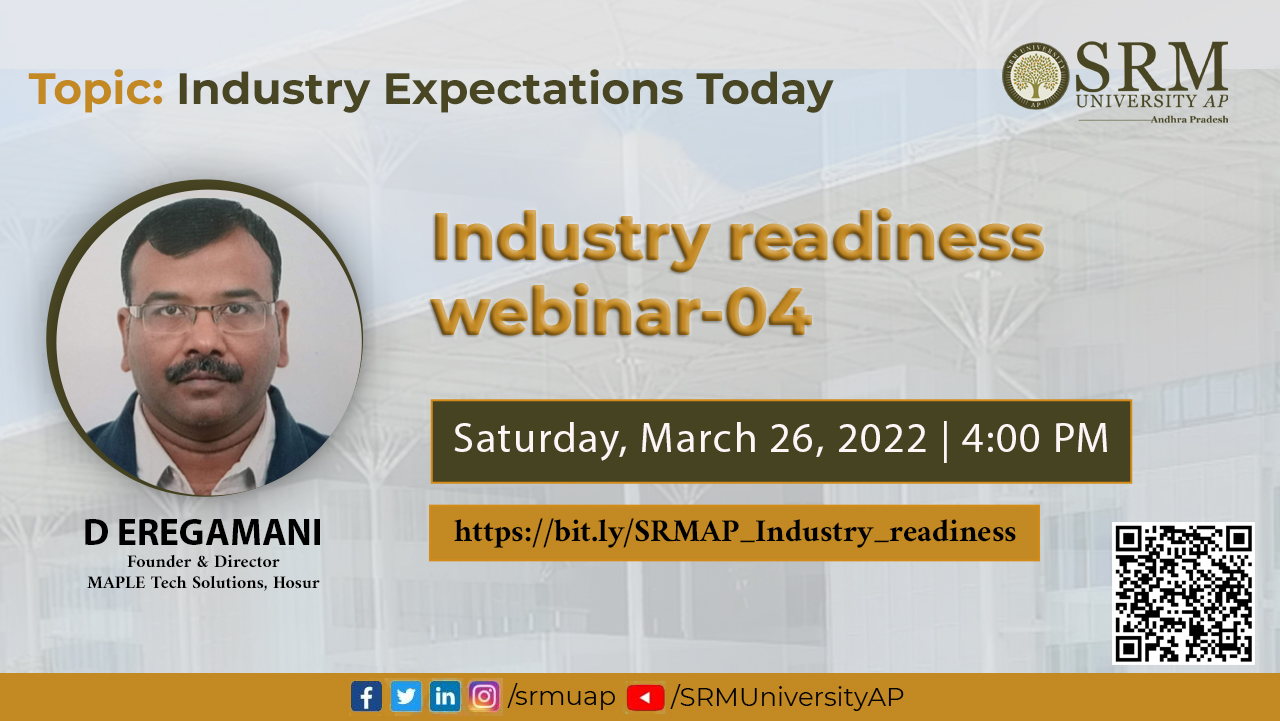 The modern business landscape is experiencing sweeping changes with each passing day, and so do the expectations in the field. Giving lessons on cutting-edge industrial practices is the need of the hour. Students should be levelled up to remain competitive in entrepreneurship and trained to keep abreast of the latest industry trends.
The modern business landscape is experiencing sweeping changes with each passing day, and so do the expectations in the field. Giving lessons on cutting-edge industrial practices is the need of the hour. Students should be levelled up to remain competitive in entrepreneurship and trained to keep abreast of the latest industry trends.The Department of Corporate Relations and Career Services is bringing forth the fourth session of the Industry Readiness webinar series on the topic “Industry Expectations Today” to give the students an extended perspective on present-day expectations in the business world.
Date: March 26, 2022
Time: 4.00 pm IST
About the Speaker:
Mr D Eragamani is the founder and director of Maple Tech Solutions, Hosur. He has 28 years of wide-ranging experience in the industrial domain. Mr Eragamani has worked as the Head of Manufacturing &TQM with major Corporates such as Titan Industries Ltd, Tyco group, TERUMOPENPOL LTD and Murugappa group.
Currently, he is running a consultancy and imparting training to industries and startups. He has gathered expertise in training by conducting workshops for MSMEs and Startups on Leadership, Business Model Canvas, Improving Leads and Digital Marketing. He has guided and judged several Quality Circle competitions.
Mr Eragamani also had the opportunity to work as an adjunct faculty in VIT School of management, NIT school of management, INDUS Business Academy, IIM-Bangalore etc. He is a member of various reputed organisations such as QCFI – Governing Council Member, Hosur Chapter; ICT Academy, Chennai; MMA, Chennai and many more. He has received numerous awards and accolades including the QCFI Platinum category award at the International forum, Taiwan and the Business Excellence award for TITAN.
Join Mr D Eragamani for a productive session and augment your possibilities of getting placed with leading companies.
Continue reading → - WHO recognises research article on pandemic detection model March 25, 2022
The healthcare system across the globe has been under colossal pressure since the emergence of novel coronavirus pandemic. The pandemic has also unveiled some of the greatest gaps in the existing healthcare systems. The research paper authored by Dr Ashok Kumar Pradhan and his PhD student E Bhaskara Santhosh, Department of Computer Science and Engineering, proposing a blockchain-based pandemic detection model was recognised by WHO and the paper was listed in COVID-19 Global literature on coronavirus disease. The paper titled “iBlock: An Intelligent Decentralised Blockchain-based Pandemic Detection and Assisting System” was published in collaboration with Saraju Mohanty, University of North Texas and Dr Venkata Ramana Badarla, Associate Professor, IIT Tirupati. The authors have expressed their deepest gratitude to Science and Engineering Research Board (SERB) for Grant number TAR/2019/000286 and SRM University-AP for supporting this work.
Abstract of the Research
The recent COVID-19 outbreak highlighted the requirement for a more sophisticated healthcare system and real-time data analytics in the pandemic mitigation process. Moreover, real-time data plays a crucial role in detection and alerting process. Combining smart healthcare systems with accurate real-time information about medical service availability, vaccination, and how the pandemic is spreading can directly affect the quality of life and economy. The existing architecture models become inadequate in handling the pandemic mitigation process in a real-time dataset. This is because, the present models are server-centric and controlled by a single party, hence to manage confidentiality, integrity, and availability (CIA) of dataset is a challenging task. Therefore, a decentralised user-centric model is essential, where the CIA of user data can be assured. In this paper, we have suggested a decentralized blockchain-based pandemic detection and assistance system named as (iBlock) that uses robust technologies like hybrid computing and IPFS to support system functionality. Moreover, a pseudo-anonymous personal identity is suggested using H-PCS and cryptography for anonymous data sharing. The distributed data management module guarantees data CIA, security, and privacy using cryptography mechanisms. Furthermore, it delivers useful intelligent information in the form of suggestions and alerts to assist the users. Finally, the iBlock reduces stress on healthcare infrastructure and workers by providing accurate predictions and early warnings using AI/ML technology.
Contributions of the Research
i) Proposes a novel architecture model for pandemic detection and alertness using a blockchain called as “iBlock”. It supports sharing of real-time data utilization.
ii) The proposed system introduces suitable privacy and security mechanisms to cover system-level data privacy and security.
iii) It also suggests a logical combination of blockchain and AI/ML on hybrid computing to support global level requirements during pandemic mitigation and alerting the systems.Social Implications
The proposed system helps in the early detection of Covid-19 and encourages people to use their health data anonymously in pandemic detection and mitigation process. Moreover, iBlock maintains all crucial data on blockchain for future sustainable healthcare solutions. The majority of pandemic detection and alerting systems are limited to prediction, however iBlock further simplifies the area-labelling to cover area wise mitigation mechanisms. The classification of areas helps the government and healthcare organizations to plan sustainable preventive measures in a real-time scenario. It also helps in prediction of new cases and death rates with the aid of a dedicated AI/ML detection engine module. To motivate the people to share legitimate data, the proposed model even suggests a reward mechanism to influence the participants.
The research investigates the advanced possibilities in smart healthcare architecture to bring down the time and effort for pandemic mitigation activities. Read to know more.
- Journey of BSc Integrative Biology student to QS ranked universities March 25, 2022
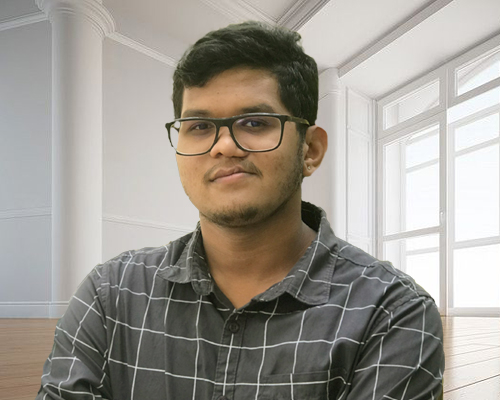 Our bright young minds bring fame and glory to the university from all around the world. Mr Haseesh Rahithya Nandam, from the final year of BSc (Hons) Integrative Biology, has received admission offers to MSc Infection and Immunity course, University College London (QS ranking 8) and MSc Medical and Molecular Virology, The University of Manchester (QS ranking 27).
Our bright young minds bring fame and glory to the university from all around the world. Mr Haseesh Rahithya Nandam, from the final year of BSc (Hons) Integrative Biology, has received admission offers to MSc Infection and Immunity course, University College London (QS ranking 8) and MSc Medical and Molecular Virology, The University of Manchester (QS ranking 27).UCL is rated the top university in the UK for research strength in the most recent Research Excellence Framework. The MSc course that Mr Haseesh has enrolled in primarily focuses on teaching concepts of infection and immunity. It contains course modules such as Molecular Virology, Evolution of Diseases, and Epidemiology.
“I am excited and happy since UCL stands in 8th rank and offers a course I dearly love to study”, says Mr Haseesh. According to him, the selection process for University College London was a piece of cake. The admission requirements were the English language proficiency test (IELTS/TOEFL) result, SoP, LoRs, CV, and Grade Card. He has also applied to Imperial College London and is waiting for the admission announcement.
SRM University-AP enables students to become the best version of themselves every single day and work towards their goals. “I am grateful for the support of my professor Dr Sutharsan Govindarajan to work in his lab. There, I got the opportunity to gain experience and learn new things”, says Mr Haseesh. He further thanked the Head of the Department, Prof Jayaseelan Murugaiyan, for his relentless guidance and support.
Continue reading → - Varying impact of health expenditure in Southeast Asia March 24, 2022
Health expenditure assumed enormous importance with the outset of coronavirus pandemic. The disparity between public and private health expenditure will often reflect in the health outcome of any nation. Through the research paper titled ‘The dynamics of public and private health expenditure on health outcome in Southeast Asia’ published in the journal Health and Social Care in the Community, Dr Shailender Singh, Associate Professor, Department of Commerce, attempts to argue that public expenditure on health has a substantial impact over private spending across the countries of ASEA.
Abstract of the Research
This study examines the dynamics of public and private health expenditure on health outcomes in Southeast Asia, vis-a-vis two of the Sustainable Development Goals (SDGs). The techniques of fixed effect, random effect, and feasible generalized least square methods are employed to obtain robust estimates. Further, the analysis dives deep into the country-specific impact of public and private health expenditure on health outcomes using the technique of seemingly unrelated regression. Estimates show that, across Southeast Asia, public health expenditure alone contributes to improving life expectancy at birth, lower levels of under-five, and non-communicable disease mortality rates. Unlike public health expenditure, private health expenditure contributes to better health outcomes only in Brunei and Singapore but not across the countries of Southeast Asia.
The paper asserts that, despite the statistical significance of private health spending with respect to the health outcomes, it does not contribute to lower mortality rate (MR) and higher life expectancy at birth. The results strongly support several prior pieces of evidence in the literature regarding health expenditure and health outcomes. The country-specific estimates show that public health spending contributes greatly to lower mortality rate, particularly in Brunei and Singapore. By contrast, private health spending does not contribute to lower levels of U5MR and NCD mortality rate across the countries of ASEA except in Cambodia, Indonesia, and Philippines.
The differences in economic development and the settings of health systems in these countries could be a plausible reason for the inability of private health expenditure to contribute to lower levels of NCD mortality rate in most of these countries. The result implies that more funding to the public health system has the potential to lower U5MR and NCD MR close to the SDGs target across the countries of ASEA. Also, strengthening the health system through providing greater access to preventive services for diabetes, hypertension, respiratory diseases, and cancers at primary care units may help in better diagnosis and management of these chronic conditions in Indonesia, Laos, and Myanmar where NCD MR is relatively high. However, an increase in funding alone may not be sufficient at improving health outcomes. For emerging conditions, diet modification, active physical exercise, little tobacco and alcohol consumption are also imperative.
The research is reported to be the first of its kind that examines the dynamics of public and private health expenditure on health outcomes in line with the SDGs targets. Apart from the traditional indicators commonly used as health outcomes in the literature (life expectancy and U5MR), the study further extends the literature by introducing NCD MR as an additional health outcome which could play a pivotal role in providing empirical evidence to the health policymakers and researchers.
Health plays an important role in promoting human capital and the economic growth of a country. The available stock of human capital in a country determines the rate of growth in its per capita income. A healthy individual contributes more to their economy by allocating more hours to work, earning more disposable income, in turn investing more in human development.
As the individual stock of health tends to diminish over time, there is a need to augment it by making more investment in time, income, and regular medical care. Thus, this research work has a societal benefit for the population of Southeast Asia to identify the threats in the field of health and focus more on their well-being for improving the state of health. Dr Singh conducted this research in collaboration with Dr Nishant Kumar, Amity University, Noida.
In future, he also intends to analyse the impact of socioeconomic and behavioural health determinants on the health system efficiency of the Middle East region, and to predict the key drivers for health care expenditure growth in the Middle East region through Grossman-PLS Modeling Approach.
- Metamaterials and their applications: Distinguished Lecture Series March 23, 2022
The Department of Electronics and Communication Engineering is hosting the first segment of the ECE Department Distinguished Lecture Series on March 24, 2022, from 12.00 pm to 01.00 pm IST. Prof Achanta Venugopal, Director, CSIR-NPL is the distinguished speaker of the event. He will be delivering a talk on the topic “Metamaterials and their Applications”.
Abstract of the Talk
Metamaterials are designed materials with unique properties that may not exist in naturally available materials. These are designed with sub-wavelength size components. In this talk, after briefly introducing metamaterials, the speaker will discuss on a few metal-dielectric and all dielectric metamaterials and their applications in wide-ranging areas covering stealth, single-photon emitters, reusable biosensors among others.
Speaker’s Profile
Venu Gopal Achanta obtained his PhD in Physics from Tata Institute of Fundamental Research, Mumbai and PhD in Electronics from Tokyo University, Tokyo, Japan. He is currently the Director of CSIR-National Physical Laboratory, Delhi. He is on lien from Tata Institute of Fundamental Research, Mumbai where he is a professor in the Department of Condensed Matter Physics and Material Science. He has served in various TIFR committees as chair and member. He is also on the senates of IISER, Berhampur and IIT, Delhi. He is a member of the executive council of Optical Society of India, vice-chair of IEEE Photonics Mumbai chapter and member of the program committee of the Association of Asia Pacific Physics Societies – Division of Condensed Matter Physics. He is on the editorial board of journals, Scientific Reports, Frontiers in Physics, Encyclopedia of Applied Physics, and the Indian Journal of Pure and Applied Physics. He is an honorary Fellow of the Metrology Society of India and senior member of IEEE. His research interests are in nano and quantum photonics with over 140 journal publications.
Join here for an insightful session with Prof Achanta Venugopal.
- Orientation: International internship and immersion programmes-II March 23, 2022
With so many options, students are frequently puzzled when selecting a course, studying its scopes, and aligning themselves with the prerequisites for going abroad.
A webinar series on International Internship & Immersion Programmes is being organised by the Office of International Relations and Higher Studies at SRM University-AP. Interested students can gain a detailed overview of international programmes and their preparation procedures.
Date: March 24, 2022. Time: 8.00 pm
Join the second episode of this illuminating series and get one step closer to your ambition of studying abroad!
Continue reading → - Dr Johannes Kirscher March 22, 2022
- CSE students bagged 2nd prize at I-Wallet design competition organised by IIT Bombay March 22, 2022
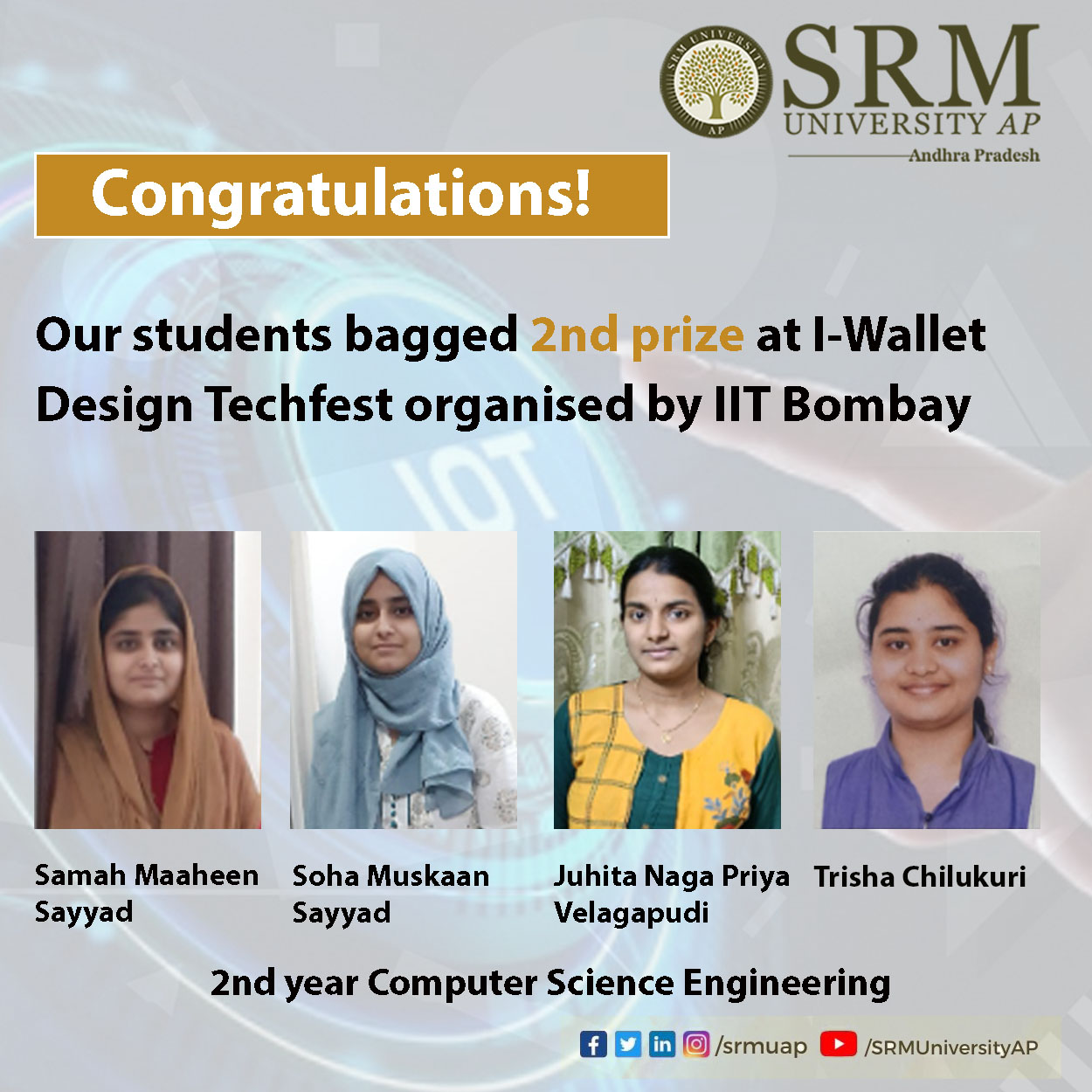 Soha Muskaan Sayyad, Samah Maaheen Sayyad, Juhita Naga Priya Velagapudi, and Trisha Chilukuri from 2nd-year Computer Science Engineering have achieved 2nd place in the I-Wallet Design Techfest, organised by IIT Bombay. Dr Sonam Maurya, Assistant Professor, Department of Computer Science and Engineering, guided the students to achieve this incredible feat.
Soha Muskaan Sayyad, Samah Maaheen Sayyad, Juhita Naga Priya Velagapudi, and Trisha Chilukuri from 2nd-year Computer Science Engineering have achieved 2nd place in the I-Wallet Design Techfest, organised by IIT Bombay. Dr Sonam Maurya, Assistant Professor, Department of Computer Science and Engineering, guided the students to achieve this incredible feat.The students started their work in December and explored a lot about IoT while working on it. More than 100 teams participated in this competition. In January, ten teams got selected for the second round, i.e., Report Submission, and our students were one of them. In February, based on the reports submitted, six teams, including our students, were selected for the final round, i.e., to present the proposed idea to the judges’ panel. Finally, the students bagged second place in the competition with cumulative prize money of INR 90,000.
Regarding the I-Wallet, students say that “Smart Wallet is an easy-to-use wallet that is designed for providing secured transactions”. It has minimal energy consumption, more security, and a few advanced features, some of which are not included in the regularly used wallets. The advanced IoT features enable it to be kept in our pockets with smartphones and smartwatches. The design received recognition from the expert panel members based on these features.
The team has also initiated the process to file a patent on the design of wallet. Students expressed their gratitude to Dr Sonam Maurya, Assistant Professor, Computer Science and Engineering, for her relentless guidance and continuous support towards the project. They also thanked SRM University-AP for providing the opportunity to participate in this national level competition organised by IIT Bombay.
Prof B V Babu, Dean, School of Engineering and Sciences, appreciated the students and their faculty mentors. “Keep up the good work, continue to excel in all your future endeavours at professional and personal levels and bring laurels to your alma mater”, he said in the congratulatory message.
Continue reading →


